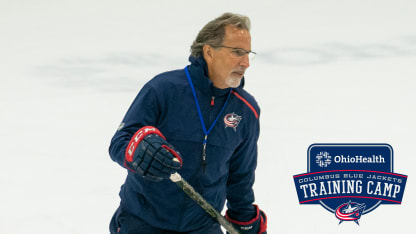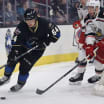Safe is death? Not quite, but Blue Jackets will look for more offense
John Tortorella trusts his team (and his goalies) enough to open things up in 2021

It remains to be seen exactly what the Blue Jackets' style of play will be this year, but head coach John Tortorella acknowledges things have to be a little bit different -- and he has the tools to make it so.
A good coach molds his team to the personnel it has on hand, and that's always been the case for Tortorella in Columbus.
When Artemi Panarin was attracting the attention of entire teams and Seth Jones and Zach Werenski were pushing the puck up the ice a few seasons ago, Tortorella encouraged his team to lean into the swashbuckling mantra. "Safe is death" led to the only 50-win season in team history in 2016-17 and a playoff series win two years later.
Torts checks in with the media on Day 1 of camp.
But with Panarin gone and two goaltenders who were unproven as NHL starters in net a year ago, Tortorella pulled the reins in. The Blue Jackets checked in waves of five, smothering opposing offenses and snuffing odd-man rushes, and the result was the third-best defensive team in the league and a fourth straight playoff berth -- as well as the league's fourth-worst offense.
Now, the head coach says the pendulum might swing a bit the other way.
"Do we throw out foundation of what we are as a team out the door? Absolutely not," Tortorella said Sunday ahead of the start of training camp. "We know how to play. We know how hard we have to play. We've grown tremendously away from the puck.
"We need to grow and release ourselves a little bit offensively to see if we can score different types of goals and play different types of games at certain times instead of the grinding that we had to do to score a goal.
"So you need to play the game different ways at certain times within a game, within a season. I hope we can add that to our repertoire as far as winning a game 5-3. We'll see how it all works out. That's incumbent upon us as far as coaches in allowing that and how we teach that."
So that will be the focus of Tortorella and his coaching staff as the Blue Jackets get ready for the Jan. 14 opener at Nashville. The team won't suddenly turn into a firewagon hockey squad of the 1980s, but Tortorella wants to free the reins a little bit when it comes to giving the green light to attack when the opportunity is there.
"It's a fine line, I think," Jones said. "We can't open ourselves up to the point where we start giving them chance after chance after chance and relying on Korpi and Elvis to make big saves for us to stay in the game and win games. We're not trying to change the way we play too much to where we're giving up three or four goals per game. I don't think that's winning hockey.
"But what Torts is talking about is just trying a few more things offensively in the right situations to give us more scoring chances, more great opportunities around the net, around the paint, maybe a little more off the rush, but defensively not changing ourselves to the point we're giving up odd-man rush after odd-man rush."
It's an interesting balance, though, and the coach fully admits that, which is one reason he'll be watching himself to make sure he's articulating the message properly and not giving mixed messages. A year ago, the message was clear -- defense came first, and while creativity was encouraged as always in the offensive zone, the team had to do all the right things to get it to that end of the ice.
It was a fair decision given the makeup of the team. Losing Panarin, one of the NHL's best offensive weapons, meant scoring wasn't going to come as easily anyway, but the real impetus to the change was when Sergei Bobrovsky left as a free agent.
There was internal faith in the skills of his longtime backup Joonas Korpisalo and European import Elvis Merzlikins, but also the realization that playing big NHL minutes would be new to each of them. Rather than hang make the goalies' jobs any harder than they had to be, Tortorella wanted to play a structured game that made it hard on opponents to create grade-A chances.
By and large that worked, and there were times when Korpisalo and Merzlikins served as the "backbone" of the team, Tortorella said. But now, with a little faith in each goalie as well in a baked-in understanding of what structured defensive hockey is, the Blue Jackets feel like they can open things up a bit to create offense.
That need was driven home when Columbus, which scored just 2.57 goals per game in the regular season, was even worse from a production standpoint in the postseason, notching 2.40 goals per game on the way to a qualifying win vs. Toronto but a first-round loss against Tampa Bay.
"I have to keep evolving and looking at our team," Tortorella said. "As hard as we played out in the bubble there in the playoffs, it just took us so much energy for us to score a goal. I want to become a better coach for our team because I think our team is ready to take that next step and develop more offensively. I have to become a better coach in allowing that to without forgetting about what our true foundation is."
Tortorella said he'll keep an eye on how the team handles this philosophy, and it will be up to him to make sure the message on how he wants the team to play is delivered throughout the season. For Blue Jackets players, it will then be up to them to put more pucks in the net and hopefully lead to more wins throughout the season.
"I think it's just maybe taking some more chances offensively and getting up in the play more," forward Boone Jenner said. "I don't think we're going to lose ourselves defensively. We've had a good emphasis on that in the last couple of years and knowing how to play the right way away from the puck, but when we get our chances with the puck in the offensive zone, just creating more that way.
"There's a lot of things we know that we can do that we'll take some more of that with us and grow as a group that way."



















